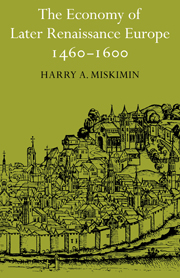Book contents
- Frontmatter
- Contents
- List of tables, graphs, maps
- Dedication
- Preface
- 1 The abstractions of law and property
- 2 Recovery: population and money supply
- 3 Agriculture: the rising demand for food
- 4 Industry: technology and organization
- 5 Trade patterns in the wider world
- 6 Finances: private and public
- 7 Retrospect
- Notes
- Bibliography
- Index
3 - Agriculture: the rising demand for food
Published online by Cambridge University Press: 30 September 2009
- Frontmatter
- Contents
- List of tables, graphs, maps
- Dedication
- Preface
- 1 The abstractions of law and property
- 2 Recovery: population and money supply
- 3 Agriculture: the rising demand for food
- 4 Industry: technology and organization
- 5 Trade patterns in the wider world
- 6 Finances: private and public
- 7 Retrospect
- Notes
- Bibliography
- Index
Summary
The quickening pace of population recovery after about 1460, and particularly the concentration of substantial numbers of persons in a few burgeoning and prosperous cities, greatly increased the need for adequate food supplies. The availability of increasing quantities of precious metals, wrested from the mines of central Europe and Latin America, converted the clear biological need for food into effective market demand. There were more consumers and they had money. As a result, market conditions for agricultural products improved throughout the whole of Europe and sixteenth-century agrarian history appears as the almost perfect inverse image of its late medieval counterpart. Whereas the earlier period had witnessed a long secular decline in the price levels of the basic food grains, the sixteenth century experienced an extended upward movement, slow at first and then increasingly rapid, but always and inexorably upward. Fernand Braudel and F. C. Spooner have sought to provide a pan-European index of the rise in wheat prices across the century and to do so both for real prices in silver and for nominal prices in money of account on the basis of an arithmetic average of fifty-nine geographically distinct series. Because averages tend to conceal diversity, these authors have attempted to preserve the range of variation by presenting their material graphically, with the average line set within a surface defined by the maximum and minimum values of the individual series.
- Type
- Chapter
- Information
- The Economy of Later Renaissance Europe 1460–1600 , pp. 47 - 82Publisher: Cambridge University PressPrint publication year: 1975



